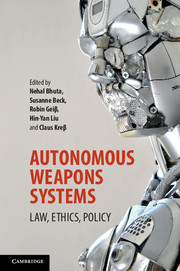Book contents
- Frontmatter
- Contents
- List of contributors
- Acknowledgements
- PART I Introduction
- PART II Meanings of autonomy and human cognition under automation
- 2 Staying in the loop: human supervisory control of weapons
- 3 The autonomy of technological systems and responsibilities for their use
- 4 Human–machine autonomies
- PART III Autonomous weapons systems and human dignity
- PART IV Risk, transparency and legal compliance in the regulation of autonomous weapons systems
- PART V New frameworks for collective responsibility
- PART VI New frameworks for individual responsibility
- PART VII Conclusion
- Index
3 - The autonomy of technological systems and responsibilities for their use
from PART II - Meanings of autonomy and human cognition under automation
Published online by Cambridge University Press: 05 August 2016
- Frontmatter
- Contents
- List of contributors
- Acknowledgements
- PART I Introduction
- PART II Meanings of autonomy and human cognition under automation
- 2 Staying in the loop: human supervisory control of weapons
- 3 The autonomy of technological systems and responsibilities for their use
- 4 Human–machine autonomies
- PART III Autonomous weapons systems and human dignity
- PART IV Risk, transparency and legal compliance in the regulation of autonomous weapons systems
- PART V New frameworks for collective responsibility
- PART VI New frameworks for individual responsibility
- PART VII Conclusion
- Index
Summary
Introduction
In the discussion on autonomous systems and their regulation, distinct concepts of autonomy are put forward. For instance, the US Military Defense Science Board provides the following definition: ‘Autonomy is a capability (or a set of capabilities) that enables a particular action of a system to be automatic or, within programmed boundaries, “self-governing.”’ In a similar spirit, George A. Bekey describes autonomy as ‘the capacity to operate in the real-world environment without any form of external control, once the machine is activated, and at least in some areas of operation, for extended periods of time.’ According to both definitions, autonomy consists in the capacity for ‘sustained independent action’. Thus, a system is autonomous to the extent that it can accomplish a task by itself, without external directions. Once the system starts its activity, there is no need for other human or artificial agents to monitor its behaviour and govern its functioning.
Stuart Russell and Peter Norvig adopt a different perspective, characterizing autonomy as ‘an agent's capacity to learn what it can to compensate for partial or incorrect prior knowledge’. According to this definition, the focus is on cognitive capacity and, in particular, on the capacity to obtain new knowledge, interacting with the environment. Thus, an agent is autonomous to the extent that it is able to appropriately expand or revise its initial stock of knowledge, so as to face the challenges of its environment. There is no need for others to reprogram an autonomous system or to provide it with new directives when novel situations are met.
Cristiano Castelfranchi and Rino Falcone adopt yet another approach, by grounding the autonomy of a system on the fact that the system tends to certain specific results due to its internal constraints or representations; it perceives and interprets its environment, defines and selects what stimuli to take into consideration, has internal states, and its behaviour also depends on such internal states. Here the focus is on the cognitive architecture of the system and on the way in which this architecture mediates external inputs and system behaviour. A system is autonomous to the extent that it does not merely react to external stimuli but, rather, integrates such stimuli into its cognitive structures, by modifying appropriately its internal states, according to its own standards and procedures, so as to determine its behaviour.
Information
- Type
- Chapter
- Information
- Autonomous Weapons SystemsLaw, Ethics, Policy, pp. 39 - 74Publisher: Cambridge University PressPrint publication year: 2016
Accessibility standard: Unknown
Why this information is here
This section outlines the accessibility features of this content - including support for screen readers, full keyboard navigation and high-contrast display options. This may not be relevant for you.Accessibility Information
- 11
- Cited by
